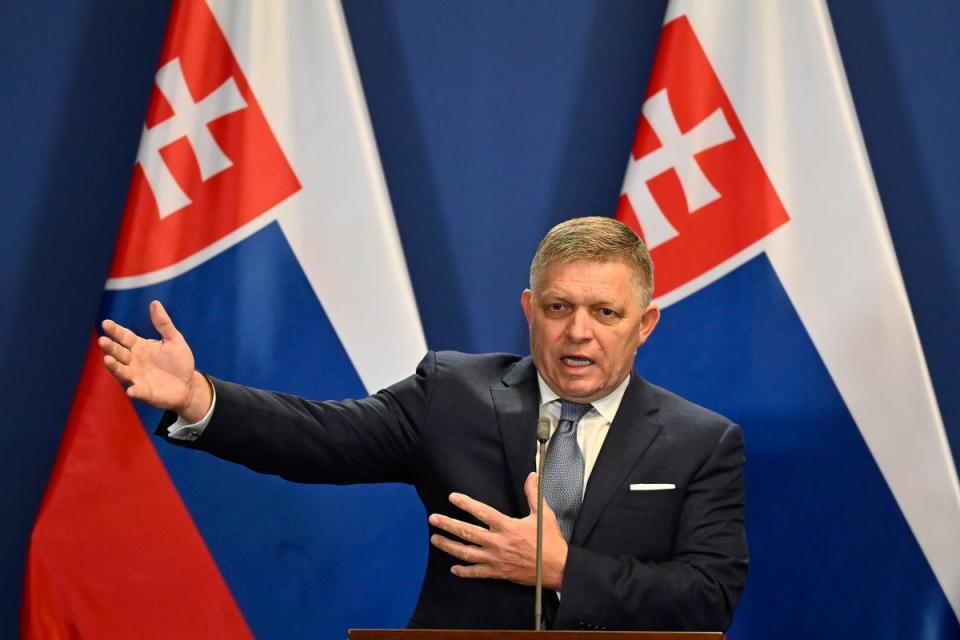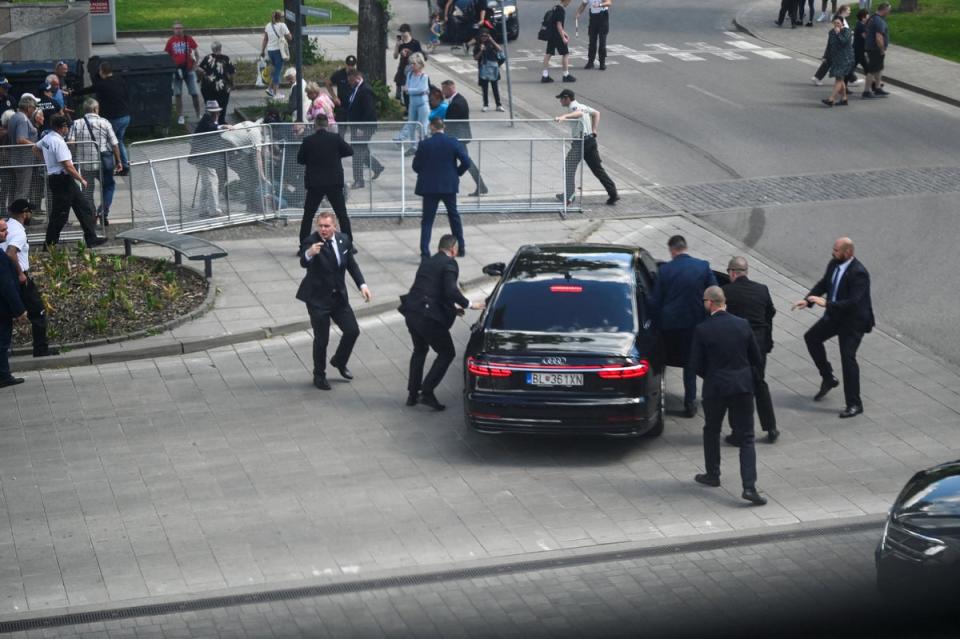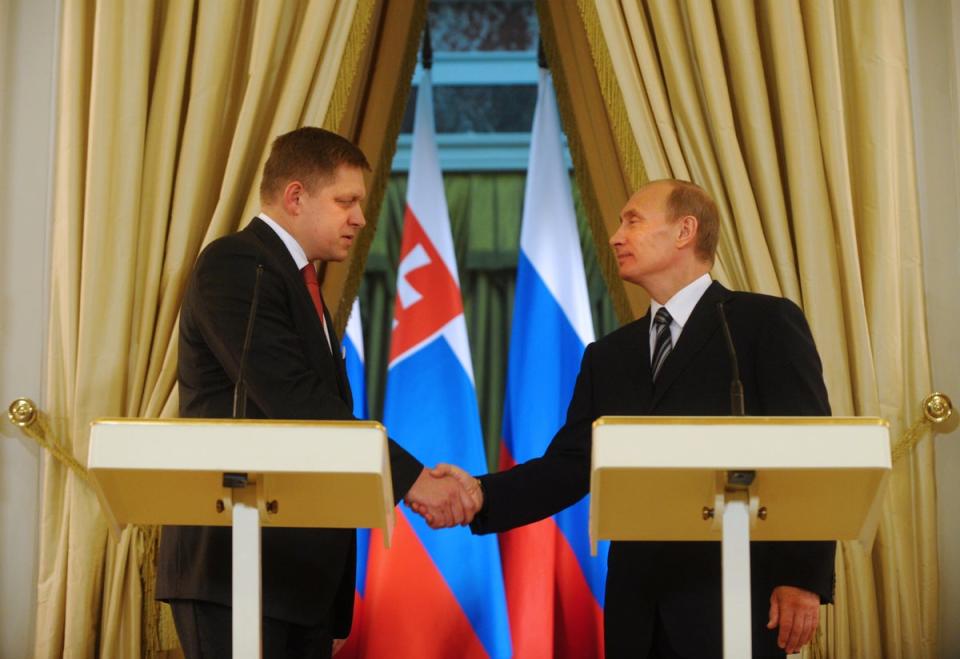Who is Slovakia’s prime minister Robert Fico?
Slovakia’s populist prime minister, Robert Fico has been shot and is in life-threatening condition in hospital.
Fico, 59, was injured after multiple shots were fired outside a cultural centre in Handlova, Slovakia – about 90 miles (150km) from the capital Bratislava – where the leader was meeting his supporters.
Images showed police detaining a suspect following the shooting, which the interior minister called an assassination attempt.
Deputy prime minister Tomáš Taraba called it a “brutal and ruthless” attack.
So who is Robert Fico, what party is he from and what is his political? The Independent takes a look below.

Who is Robert Fico?
Born to a working-class family in September 1964, Slovakian prime minister Robert Fico graduated with a law degree in 1986 and joined the then-ruling Communist party.
After the 1989 Velvet Revolution that led to the break up of former Czechoslovakia, he worked as a government lawyer and represented Slovakia at the European Court for Human Rights.
During a three-decade career, Fico has moved between pro-European mainstream and nationalistic positions opposed to European Union and US foreign policy.
What party does he belong to?
Fico has run the Smer-SD party since 1999 after establishing it to oppose the reformist centre-right cabinet. He had been turned down for a ministerial post by the Democratic Left, the political heirs to the Communist Party.
Fico, 59, returned to power in Slovakia last year. Having previously served twice as prime minister, from 2006 to 2010 and again from 2012 to 2018, his third term, won in September last year, made him the longest-serving head of government in Slovakia's history.
After the win in 2006 – two years after Slovakia joined the EU – Fico kept the nation on course to adopt the Euro in 2009 despite forming a government with nationalists.

Fico and Smer have most often been described as left-populist, though he has also been compared to right-wing politicians like the nationalist prime minister of neighboring Hungary, Viktor Orban.
Out of power in 2010, Fico’s party won again two years later after another centre-right coalition broke up. A tough stance against migrants brought re-election in 2016. After that win, he declared he wanted Slovakia as part of the EU's core with France and Germany.
Fico's political fortunes faded in 2018 when journalist Jan Kuciak, who was investigating allegations of high-level corruption, and his fiancee Martina Kusnirova were killed by a contract killer. This fuelled mass protests against graft and Fico was forced to resign. Smer lost power in a 2020 election to parties pledging to weed out corruption, and his party split.
Fico has hit out at accusations of corruption that have dogged his party during his political career. He was charged with criminal conspiracy in 2022 to use police and tax information on political foes – charges he denied and which were later dropped.
What does he believe?
During a three-decade career, Fico has skilfully weaved between pro-European mainstream and nationalistic anti-Brussels and anti-American positions, while showing a willingness to change course depending on public opinion or changed political realities.
Polling at around 10 per cent in 2020, the Covid pandemic opened a door for Fico, who sought to address voter fears in slamming government health measures.

"He became the most prominent political representative of a movement against face masks or vaccination," political analyst Grigorij Meseznikov told Reuters.
At the same time he a tapped into dissatisfaction with bickering in the ruling government and raised doubts with its pro-Western course, chiming with pro-Russian narratives on social networks that had spread across Slovakia.
That is part of having embraced more extreme positions over the past four years that include strident criticisms of western allies and pledges to stop military support for Kyiv. He has also argued that Nato and the United States provoked Moscow into its invasion of Ukraine. He has also expressed opposition to sanctions on Russia and threats to veto any future Nato membership invite for Ukraine.
Fico certainly admires Vladimir Putin, having said that he would not enforce an International Criminal Court arrest warrant against the Russian leader if he visited Slovakia. That warrant came after the start of the invasion of Ukraine. He also respects Orban, who he says “defends the interests of his country and his people”.
After Fico’s latest election victory last year, the new government immediately halted arms deliveries to Ukraine. Thousands repeatedly took to the streets across Slovakia to rally against Fico's pro-Russian and other policies, including plans to amend the penal code to eliminate a special anti-graft prosecutor and to take control of public media.
Fico's return to power has caused concern among his critics that he and his party will lead Slovakia away from its pro-Western course. He vowed to pursue a "sovereign" foreign policy, promised a tough stance against migration and non-governmental organisations, and campaigned against LGBTQ+ rights.
Last month, the government approved a proposal to abolish the public broadcaster and replace it with a new body, sparking outrage of opposition parties who say that the government will then have control of public radio and television.
The same month, Peter Pellegrini, a Ukraine-sceptic and close ally of Fico, won a run-off vote in presidential elections against the pro-western opposition candidate, Ivan Korcok and will succeed Zuzana Caputova who has been vocal in her support for Kyiv.
Reuters and Associated Press contributed to this report

 Yahoo News
Yahoo News 
